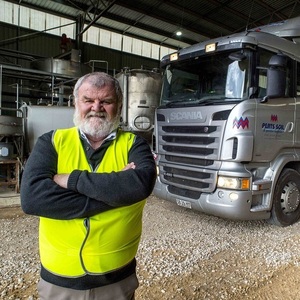Peats Soil fuels new Scania fleet with its own B100 in Australia

Photo: Scania Australia
October 8, 2015
BY Scania Australia
Willunga, South Australia-based Peats Soil has developed its own biodiesel manufacturing plant, utilizing “dirty water” it collects from food manufacturing locations.
The biodiesel will be used to fuel a new fleet of 13 Scania trucks it is purchasing for its collection and delivery operations around the state.
Advertisement
Peats Soil Managing Director Peter Wadewitz said he aims to manufacture more than 1 million liters (264,000 gallons) of biodiesel in the first year at his McLaren Vale headquarters an hour south of Adelaide, which would provide the bulk of the 1.3 million liters his fleet of trucks and loaders will consume annually.
“The first batch of 1,000-liters is now in production,” Wadewitz said. “We collect residual wash-down water from food preparation and manufacturing locations. We call it ‘dirty water.’ From this we extract the fats we use as the base stock of the biodiesel.”
Advertisement
Wadewitz said the biodiesel manufacturing concept has been developed in association with Adelaide University and has attracted funding from the Australian Research Council.
“We have now progressed from proving the concept in a laboratory to building a new biodiesel manufacturing facility at our headquarters in Willunga,” Wadewitz said. “We hope to make 1 million liters of biodiesel a year, all of which will be consumed by our trucks and the nine loaders we use in the yard to load the trucks with our organic garden products. We have ordered 13 new trucks from Scania that will run on 100 percent biodiesel. These trucks will replace our existing Scania fleet, plus we are adding two more trucks and two more loaders. This means we will be creating four new jobs for drivers plus adding staff for the laboratory.”
Alfons Reitsma, regional executive manager for Scania in South Australia, said, “Scania is delighted that Peter Wadewitz has decided to replace his fleet with new Scanias that run on 100 percent biodiesel. We will be supplying Peats Soil with 480-hp six-cylinder trucks and some V8-powered 560-hp prime movers which will be used to collect waste matter and then deliver bulk and bagged organic supplies once they have been processed at the plant. Scania already produces some of the most fuel-efficient heavy trucks available in Australia, but the switch to biodiesel will make this one of the lowest CO2 emitting fleets in Australia. Scania promotes environmental sustainability providing operators with a variety of low emission solutions. Our research shows biodiesel produces 80 percent less CO2 than regular diesel, making it exceptionally environmentally friendly.”
Related Stories
Global digital shipbuilder Incat Crowther announced on June 11 the company has been commissioned by Los Angeles operator Catalina Express to design a new low-emission, renewable diesel-powered passenger ferry.
ATR and French SAF aggregator ATOBA Energy on June 19 signed a memorandum of understanding (MOU) to explore ways to facilitate and accelerate sustainable aviation fuel (SAF) adoption for ATR operators.
Argent Fuels, a leading provider of carbon-saving fuels in the UK, is accelerating its efforts to support a greener future. The expansion of its High Blend Biodiesel will supply to bus, coach, HGV fleets and rail in the south of the UK.
Sprague Operating Resources LLC on June 24 announced it has been selected by the New York City Department of Citywide Administrative Services to supply renewable diesel for its marine fleet, including the iconic Staten Island Ferry.
On June 17, the NYC Department of Citywide Administrative Services and the Department of Transportation announced the start of the Staten Island Ferry’s transition to renewable diesel, marked by the delivery of the first barge of fuel.
Upcoming Events










